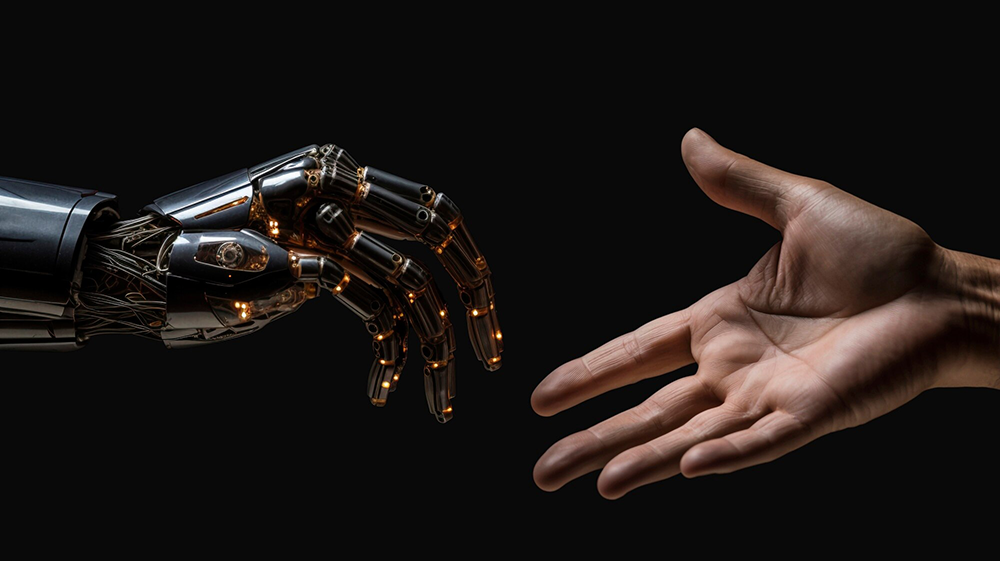Debunking AI Myths: Why Fear of AI in Marketing Is Holding Your Brand Back

The utilization of Artificial Intelligence (AI) in marketing is a topic that tends to evoke a range of emotions. While there is enthusiasm about its potential to revolutionize industries and fuel progress, there is also apprehension about potential job displacement, loss of autonomy, and uncertainty. However, it’s important to acknowledge that these concerns, often stemming from misunderstandings, can pose obstacles to realizing the full benefits of AI for your brand.
So, where do these fears stem from? Many people feel apprehensive about AI due to exaggerated media portrayals and a general lack of understanding about what AI truly is and how it functions. The idea of machines potentially taking over human jobs or making decisions autonomously can be intimidating. Additionally, AI has quietly integrated into marketing for some time, which many people may not realize. It has been powering search engines, recommendation algorithms, and even personalized email campaigns for years.
In fact, AI has been steadily evolving in marketing and is becoming more prominent due to technological advancements. According to a survey by McKinsey, 50% of companies have already adopted AI in at least one business function, with marketing and sales being the most common areas. The long-standing yet often unnoticed presence of AI in marketing might be contributing to the fear of the unknown among brands, but they now face pressure to adapt to these advancements more openly and transparently. In this blog, we’ll attempt to debunk the most common AI myths, presenting AI as a partner in marketing rather than a threat.
Myth 1: AI Will Replace Human Jobs in Marketing
The Fear: One of the most pervasive fears surrounding AI is that it will lead to mass unemployment, especially in creative industries like marketing. The idea of machines replacing human roles is a daunting prospect. A study by PwC found that 37% of business leaders believe AI will result in job losses. This statistic highlights a major concern: if machines can automate tasks, what will happen to the human workforce? Many worry about a future in which algorithms entirely manage creative processes, leaving marketers unemployed.
The Reality: AI is not about replacing jobs but rather transforming them. According to the same PwC study, 67% of business leaders see AI as a catalyst for job creation rather than job destruction. AI reshapes jobs, allowing humans to focus on higher-order tasks that require creativity, strategic thinking, and emotional intelligence—areas where AI still lags behind humans. For example, AI can handle data analysis, freeing marketers to focus on developing creative campaigns that emotionally resonate with consumers.
Based on the World Economic Forum, AI is projected to generate 97 million new jobs by 2025 while displacing only 85 million, resulting in a net gain of 12 million jobs globally. This indicates that despite potential role changes, the overall job market in marketing and other fields will experience positive effects from AI adoption.
AI’s capacity to process and analyze vast amounts of data in real-time empowers marketers to make more insightful decisions. However, this does not diminish the essential need for human oversight and creativity. Instead of viewing AI as a competitor, it should be regarded as a powerful tool that amplifies human capabilities. For example, AI can swiftly identify trends and patterns in consumer behavior, which marketers can leverage to create more targeted and effective campaigns. The future of marketing is likely to involve humans and AI working in harmony, with each entity capitalizing on their strengths to achieve optimal results.
Myth 2: AI Lacks Creativity and Human Touch
The Fear: There is a common concern that AI, being inherently logical and data-driven, may lack the creativity and emotional intelligence necessary for effective marketing. Some worry that AI-driven marketing could potentially lead to the creation of generic, uninspired content that fails to resonate with consumers on a personal level. Marketing involves both storytelling and emotional resonance alongside data, and there is a hesitancy around whether AI can replicate the human touch required to craft truly compelling narratives.
The Reality: This perception overlooks the fact that AI is a tool designed to enhance, not replace, human creativity. AI can generate data-driven insights that serve as a foundation for creative campaigns, allowing marketers to focus on the more imaginative aspects of their work. A Gartner study predicts that by 2024, AI identification of emotions will influence more than half of the online advertisements you see. This demonstrates AI’s growing ability to understand and react to human emotions, making marketing campaigns more effective and personalized.
AI-driven tools, such as natural language processing (NLP) and machine learning algorithms, are increasingly sophisticated in understanding and predicting consumer behavior. These tools can analyze vast amounts of data to identify trends, preferences, and even emotional cues, providing marketers with the insights needed to craft personalized, emotionally resonant messages.
In the realm of marketing, AI doesn’t replace the human touch; it enhances it. AI can efficiently analyze consumer sentiment from social media interactions, equipping marketers with crucial insights into their audience’s perceptions of their brand. This data can then be utilized to customize campaigns that effectively tap into these emotions, delivering a more personalized and captivating consumer experience. AI is a creative ally, offering the essential data and insights for crafting emotionally resonant campaigns that deeply resonate with audiences.
Myth 3: AI Is Too Complex and Expensive for Small Businesses
The Fear: Many small and medium-sized businesses (SMBs) believe that AI is too complex, costly, and only accessible to large corporations with big budgets. It’s concerning that there’s a fear that AI requires significant investments in technology, expertise, and infrastructure – resources that small businesses simply don’t have. This perception has led to the belief that AI is a luxury reserved for industry giants, putting smaller players at a disadvantage.
The Reality:
The reality is that AI technology has become increasingly accessible and affordable, even for small businesses. A Salesforce survey found that 56% of small business owners believe that AI is more accessible than ever, and 46% already use AI in some form. This indicates that AI is not only within reach for small businesses but is already being adopted at a significant rate.
Advances in AI have led to the development of user-friendly tools that don’t require extensive technical knowledge to implement. Many AI-powered marketing solutions are now available as software-as-a-service (SaaS), allowing businesses to access cutting-edge technology on a subscription basis, without the need for significant upfront investment.
AI possesses the power to empower small and medium-sized businesses (SMBs) by enabling them to compete with larger companies effectively. This is achieved through the automation of tasks such as customer segmentation, content creation, and lead scoring. The resulting efficiencies lead to substantial cost savings and highly impactful marketing campaigns. For instance, AI excels at assisting small businesses in identifying high-value customer segments and creating targeted campaigns that authentically resonate with those specific audiences, all without the need for a large marketing team. By handling repetitive tasks, AI allows small business owners to confidently prioritize their core strengths—such as building relationships with their customers and expanding their business.
Myth 4: AI Compromises Data Privacy
The Fear: In light of escalating concerns about data privacy, many marketers express apprehension that AI may potentially exacerbate these issues through the collection and analysis of extensive consumer data. There is a prevailing concern that AI’s ability to process and analyze data on a large scale may inadvertently lead to privacy infringements, data breaches, and an erosion of consumer trust. In an era where data breaches are on the rise, the prospect of granting AI access to sensitive consumer information understandably raises concerns.
The Reality: AI can enhance data security by identifying potential threats and vulnerabilities more quickly than human analysts. According to a study by McKinsey & Company, 76% of companies are using AI to improve their data privacy and security practices. This indicates that AI is becoming an essential tool rather than a threat in safeguarding consumer data.
Modern AI tools are often designed with privacy in mind, incorporating features that ensure compliance with regulations like the General Data Protection Regulation (GDPR) in the European Union and the California Consumer Privacy Act (CCPA) in the United States. These tools can help businesses manage data more securely, providing real-time alerts about potential breaches and automating compliance tasks.
AI is instrumental in helping businesses by anonymizing and encrypting data, ensuring that sensitive information is safeguarded during analysis. For instance, AI can adeptly identify and mask personally identifiable information (PII) before processing, significantly reducing the risk of data breaches. With AI-driven analytics, businesses can confidently gain valuable insights without compromising individual privacy, empowering marketers to craft personalized experiences while upholding consumer trust. In this manner, AI serves as a potent ally in championing data privacy and guiding businesses through the intricate terrain of data protection regulations.
Myth 5: AI Is a Fad That Will Pass
The Fear: Understandably, some marketers may be hesitant to invest in AI due to concerns that it may be just a passing trend. They fear that AI, like many other technological trends, may not live up to the hype, potentially resulting in a costly mistake for those who invest in it now. However, despite the rapid pace of technological change, it’s important to consider the long-term potential of AI in marketing.
The Reality: AI is not a passing trend; it’s the future of marketing. As technology continues to evolve, AI will become even more integral to marketing strategies. According to a report by Statista, the global AI market is expected to grow from $58.3 billion in 2021 to $309.6 billion by 2026. This rapid growth indicates that AI is not only here to stay but is set to become a dominant force in the global economy. AI is transforming various industries, including healthcare, finance, and marketing. Marketing is no exception to this transformation, and AI is undoubtedly set to become a permanent fixture in the marketing landscape, driving innovation and growth for years to come.
Strategic investment in AI now will undoubtedly position your brand ahead of the competition and enable you to leverage the tremendous opportunities that AI presents. As AI advances, businesses that do not adopt AI-driven marketing strategies undoubtedly risk being left behind. Undeniably, AI can empower businesses of all sizes to optimize their marketing efforts, enhance customer experiences, and deliver exceptional results. Embracing AI allows marketers to stay ahead of the curve and ensures their brand remains highly competitive in an increasingly digital world.
Your Opportunity to Take AI for a Test Drive
It’s a common misconception that AI in marketing poses a threat, leading to concerns that may impede your brand’s progress. However, many of these concerns are unfounded. AI is not intended to replace human jobs, stifle creativity, or jeopardize data privacy. On the contrary, it presents opportunities to augment efficiency, creativity, and security in marketing. AI will increasingly be integrated into marketing strategies, enabling brands to engage with consumers in novel and inventive ways.
In our attempt to debunk these myths, we hope to empower marketers to embrace AI as a valuable tool rather than something to fear. The future of marketing hinges on the collaboration between humans and AI, as each complements the other’s strengths. Capitalizing on AI’s potential to propel growth, elevate customer experiences, and outperform the competition is imperative. Interested in taking AI for a test drive? Learn about our Bryj AI Marketing Co-Pilot coming this Fall 2024, and sign up for exclusive access!


